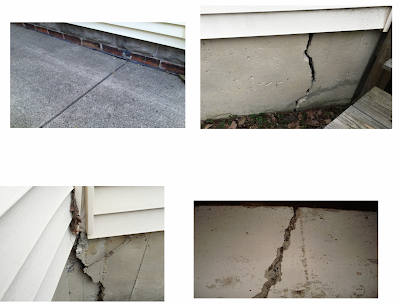What Is Street Creep?

This is a term that I have never used in my home inspection reports. Because we are only inspecting one house and not an entire neighborhood; we would not necessarily be able to determine if the compromised foundation we are inspecting is limited to just that house. However we see many areas that are prone to foundation issues. I know every time I get a call for an inspection in one of these towns, I understand there is a chance there will be foundation issues. Again, we are only inspecting one house, so this term would probably not be put on a report. I had to do a little research on Street Creep
Street Creep, is a slang for movement, shift or expansion in concrete streets or sidewalks. Force or pressure, caused by expansive soils, heavy vehicles, and long term settlement, pushes the street or walkways against the driveway and possibly into the home’s foundation producing serious cracks in foundation walls. This problem may be more significant on homes with concrete driveways and attached garages. Homes located at the end of “T” intersections, at the end of cul-de-sacs, and on the outside of a curve are especially susceptible to Street Creep damage. Homes built on hills are more susceptible to creep because gravity will induce paved streets and driveways to “slide” downhill. Although this is a national problem, it is more prominent in wet areas and areas with expansive clay soils. Expansive soils expand significantly when saturated with water. This expansion is largely due to a chemical attraction of water molecules between layers of clay minerals called Smectites. Dry regions experience the downhill slide scenario. Typically, it is not as noticeable in regions without basements but it still occurs.
The most common preventative fix for street creep is installing an expansion joint between the slabs to absorb the flex. Expansion joints, also called isolation joints, are used to relieve flex type stresses due to vertical movement of slab-on-grade applications. An expansion joint is simply a buffer made of a rubberized material inserted between two slabs of concrete. Properly installed, it will shrink and expand as the concrete moves, absorbing the pressure and stress of the movement before it starts cracking and shifting foundation walls. The driveway may already have an expansion joint but Street Creep may still occur if it not installed properly. Some individuals recommend installing a vertical flexible buffer joint in the foundation walls. So what are things a home inspector could look for:
- Take a screwdriver and try to tamp it down between the expansion joint and the concrete. You should be able to drive the screwdriver or knife blade down a good 4-5 inches. But, if you’re hitting concrete at just 2 or 3 inches, the expansion joint is not installed properly.
- Most contractors will pour the entire driveway and then while the concrete is still wet insert the expansion joint material into the wet concrete. If the depth of the concrete exceeds the width of the expansion material, there can be inches of concrete beneath the expansion material that renders the expansion joint useless. When the slab expands it will push the concrete underneath the expansion material and could then push into foundation walls causing damage to the home.
- Check expansion joints: If the joints seem unusually tight or compressed — you might say, “squeezed” or “crushed” – there may be a problem.
- Check garage floor / foundation walls: If there are cracks in the foundation, outside or in, or if the garage floor slab is pulling away from the garage wall (foundation) this may indicate an issue.
- Remember, these are just possible indicators of Street Creep. If you see real concerns, note it in your report and refer a structural engineer or a professional foundation repair contractor to further evaluate.
Related Articles:
- Inspecting Notches & Holes In Joists
- Inspecting Manufactured I Joists
- Inspecting Floor Trusses
- Carbon Fiber Foundation Repair Inspection
Want To Learn More? Click HERE to Search Our Full Database Of Home Inspector Newsletters.



